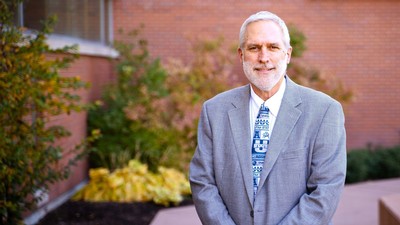New Research Provides Maps of Climate Change Opinions by Political Party
Assistant Professor Peter Howe of Department of Environment and Society in Quinney College of Natural Resources.
A new study published in the journal Climatic Change finds substantial differences in the climate change views of both Republicans and Democrats across U.S. states and congressional districts. The research is led by Matto Mildenberger of the University of California Santa Barbara together with colleagues Peter Howe at Utah State University and Jennifer Marlon and Anthony Leiserowitz at Yale University.
The research team combined information from state voter files with climate and energy opinions collected in national surveys between 2008 and 2016 by the Yale Program on Climate Change Communication and the George Mason Center for Climate Change Communication. The data allowed them to estimate the geographic distribution of Republican and Democratic climate and energy opinions across the country.
The maps describe the distribution of both Democratic and Republican opinions on climate change across all US states and congressional districts. Republicans are less likely overall to think that global warming is happening, but there is substantial spatial variability – for example, 62 percent of New York Republicans believe global warming is happening, while only 48 percent of Republicans in Nebraska and Kansas agree.
“While subsets of the Republican voting public do not support climate policies and hold views consistent with party elite, Republican climate and energy opinions are more varied than might be presumed from political discourse,” says Mildenberger. “Similarly, the results emphasize consistent support among Democrats for climate and energy policies, despite variation in belief intensity.”
Howe said that the groups previous research showed that there is geographic diversity in Americans’ opinions about global warming, even though most Americans think that global warming is happening and support policies to reduce carbon pollution.
“In this new paper, we show that this diversity in opinions also exists among people who belong to the same political party; for example, Republicans in Florida more strongly support regulating carbon pollution than Republicans in Texas and Democrats in Utah are more likely to be worried about global warming than Democrats in Illinois,” Howe said.
Maps that show the distribution of climate opinions among Republicans and Democrats have been made available by the authors at http://climatecommunication.yale.edu/visualizations-data/partisan-maps-2016/
Related Links
Quinney College of Natural Resources
Department of Environment and Society
Contact: Peter Howe, 435-797-9457, peter.howe@usu.edu
Public Information Officer: Traci Hillyard, 435-797-2452, traci.hillyard@usu.edu
Comments and questions regarding this article may be directed to the contact person listed on this page.






